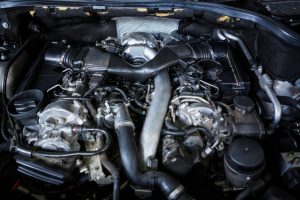What is Torque in Cars?
Engine torque is a fundamental concept in automotive engineering, often discussed alongside horsepower. While horsepower gets much of the attention in car advertisements, torque plays a crucial role in a vehicle’s performance. Understanding torque and its implications can help car enthusiasts and potential buyers make informed decisions.
Understanding Torque
Torque is defined as a rotational force or twisting force. In the context of cars, it refers to the engine’s ability to generate this force to turn the wheels and propel the vehicle forward. It is measured in units such as pound-feet (lb-ft) or newton-metres (Nm). The concept of torque can be likened to using a wrench to loosen a bolt. The force applied at a distance from the pivot point creates torque, which results in the rotation of the bolt. Similarly, in a car, the engine produces torque that turns the crankshaft, ultimately moving the vehicle.
Torque vs. Horsepower: Understanding Maximum Torque
Torque and horsepower are often mentioned together, but they represent different aspects of engine performance. Torque measures the engine’s strength or pulling power, while horsepower indicates how quickly that power can be delivered. Peak torque occurs earlier in the engine’s rev range compared to peak horsepower, making it more relevant for everyday driving situations, particularly in urban environments where responsive acceleration is crucial.
- Torque: Responsible for the initial acceleration of a vehicle. It is the force that pushes you back into your seat when you accelerate.
- Horsepower: Determines the vehicle’s top speed and its ability to maintain that speed.
The relationship between torque and horsepower is mathematically expressed as:
Horsepower=Torque×RPM 5252 Horsepower=5252 Torque×RPM
This equation shows that horsepower is derived from torque and engine speed (RPM), highlighting their interconnected nature.
Importance of Torque in Cars
Torque is critical for several reasons:
- Acceleration: Higher torque allows for quicker acceleration, making a car feel more responsive, especially at lower speeds. This is particularly beneficial in stop-and-go traffic or when overtaking other vehicles.
- Towing and Hauling: Vehicles with high torque are better suited for towing heavy loads or carrying substantial cargo, making it essential for trucks and SUVs. A high torque engine is particularly beneficial for these tasks, as it provides the necessary power to handle demanding driving conditions.
- Off-Roading: In off-road conditions, torque helps vehicles navigate challenging terrains by providing the necessary force to overcome obstacles.
Torque in Different Types of Engines: Internal Combustion Engine
Torque characteristics vary depending on the type of engine:
- Internal Combustion Engines (ICE): In traditional gasoline or diesel engines, diesel engines tend to produce more torque at lower RPMs compared to gasoline engines, making them ideal for heavy-duty applications.
- Electric Vehicles (EVs): Electric cars provide instant torque from a standstill, providing rapid acceleration. This characteristic makes EVs feel more powerful and responsive compared to traditional ICE vehicles.
Practical Implications of Torque
Understanding torque can influence buying decisions based on driving preferences and needs:
- City Driving: Vehicles with higher torque at lower RPMs are more suitable for urban environments, providing quick and smooth acceleration in traffic. Vehicles with higher torque at lower engine speeds are more suitable for urban environments.
- Highway Driving: While torque is essential for initial acceleration, maintaining high speeds relies more on horsepower.
- Performance Cars: Enthusiasts looking for exhilarating acceleration and responsive handling should consider vehicles with high torque figures.
The Science Behind Torque: Rotational Force Explained
To delve deeper into the science of torque, it’s essential to understand the physics involved. Torque is calculated as the product of force and the distance from the point of rotation. Mathematically, it is expressed as:
Torque=Force×DistanceTorque=Force×Distance
In automotive terms, the engine generates force through combustion or electric power, and this force acts on the crankshaft. The distance in this equation is the radius at which this force is applied, typically the length of the crank arm in the engine. Internal combustion engines achieve maximum torque only at specific engine revs.
How Torque Affects Driving Experience
The amount of torque an engine produces significantly impacts the driving experience:
- Low-End Torque: This refers to the torque available at lower RPMs. It is crucial for everyday driving, allowing for smooth starts and acceleration without needing to rev the engine excessively. High torque engines provide ample power without frequent gear changes.
- High-End Torque: This is the torque available at higher RPMs, often important for performance vehicles that require sustained power at high speeds.
Drivers who appreciate a relaxed driving style may prefer vehicles with abundant low-end torque, as it provides ample power without frequent gear changes. Conversely, performance enthusiasts might seek high-end torque for thrilling acceleration and speed.
Torque and Transmission
The transmission system in a vehicle plays a vital role in managing torque. It ensures that the engine’s torque is effectively transferred to the wheels, optimising performance and fuel efficiency. Different types of transmissions handle torque in various ways:
- Manual Transmission: Allows drivers to manually select gears, giving them control over how torque is applied. This can be advantageous for those who enjoy a more engaged driving experience.
- Automatic Transmission: Automatically selects the appropriate gear based on speed and load, providing a smoother and more convenient driving experience. Modern automatic transmissions are highly efficient at managing torque.
- Continuously Variable Transmission (CVT): Offers a seamless range of gear ratios, allowing the engine to operate at its most efficient RPM for a given speed. This can enhance fuel efficiency and optimise torque delivery.
Torque in Different Driving Conditions for Electric Cars
Torque plays a crucial role in various driving conditions, influencing how a vehicle performs:
- Hilly Terrain: Vehicles with higher torque can climb steep hills more easily, as they have the necessary power to overcome gravitational forces.
- Snow and Ice: Torque management is essential in slippery conditions. Too much torque can cause wheel spin, while too little can prevent the vehicle from moving. Modern vehicles often include traction control systems to manage torque effectively.
- Racing: In motorsports, torque is a critical factor in achieving rapid acceleration and maintaining high speeds on the track. Engineers often focus on optimising torque curves to suit specific racing conditions.
The Evolution of Torque in Automotive Design
Over the years, automotive design has evolved to enhance torque performance:
- Turbocharging and Supercharging: These technologies increase the amount of air entering the engine, allowing for more fuel combustion and, consequently, more torque. Turbocharged engines are common in modern vehicles, providing significant torque boosts without increasing engine size.
- Hybrid Technology: Hybrid vehicles combine internal combustion engines with electric motors, offering enhanced torque delivery. The electric motor provides instant torque, complementing the engine’s output and improving overall performance.
- Advanced Materials and Engineering: Modern engines use lightweight materials and advanced engineering techniques to reduce friction and improve torque efficiency. This results in engines that deliver more torque with less fuel consumption.
Choosing the Right Torque for Your Needs
When selecting a vehicle, it’s essential to consider your specific needs and how torque will impact your driving experience:
- Daily Commuting: For city driving, a vehicle with good low-end torque will provide a comfortable and efficient ride.
- Long-Distance Travel: If you frequently travel on highways, consider a vehicle with balanced torque and horsepower for sustained high-speed performance.
- Towing and Hauling: If you need to tow trailers or carry heavy loads, prioritise vehicles with high torque ratings, especially at low RPMs.
- Off-Road Adventures: For off-road enthusiasts, torque is crucial for navigating rough terrain and overcoming obstacles. Look for vehicles with robust torque figures and off-road capabilities.
Conclusion
Torque is a vital aspect of a car’s performance, affecting acceleration, towing capacity, and overall driving experience. Whether you’re considering a powerful sports car, a robust SUV, or an efficient electric vehicle, understanding torque will help you make an informed decision that aligns with your driving needs and preferences. By appreciating the role of torque, you can better evaluate a vehicle’s capabilities and choose one that offers the desired performance characteristics.



